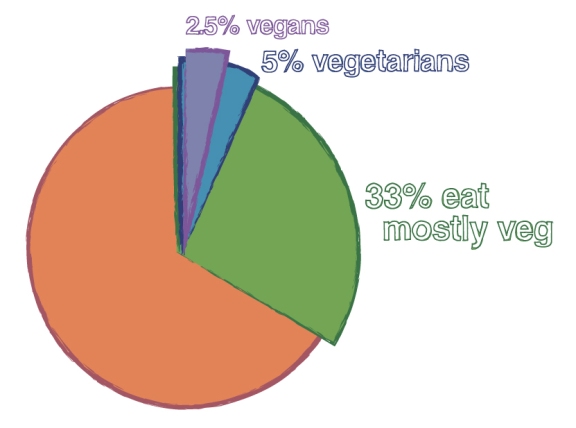Regardless of how you define yourself, including more plants in your diet can make you healthier, provide important nutrients, and possibly help conserve environmental resources.
What are plant-based diets?
Plant-based diets, usually called “vegetarian” diets, consist of vegetables, fruits, beans/legumes, whole grains, nuts, seeds and sometimes animal products such as dairy and eggs. A total vegetarian, also known as a vegan, includes only foods from the plant/fungi kingdom without the addition of dairy or egg products.
“Vegetarianism” vs “vegetarians”
“Vegetarianism” is a set of choices; “vegetarian” is an identity or a label.
Most vegetarians do not eat animal flesh, although people’s actual diets vary. Some folks call themselves “vegetarian” but also incorporate some animal products, such as seafood or fish. A few vegetarians will even occasionally eat things like poultry or red meat. For most vegetarians, the conscious and purposeful choices they make about nutritional habits are what really define a vegetarian diet.
Thus, vegetarianism (as a collection of dietary choices) is mostly about what people eat (or don’t) but also about how they view and understand their eating habits.

“Vegetarian” vs “vegan”
In 1944, the first Vegan Society was created in England, and the name vegan (pronounced VEE-gan) was developed to differentiate vegans from vegetarians.
Vegans abstain from eating all meat, fish, or fowl, as well as any other foods of animal origin such as butter, milk, yogurt, honey, eggs, gelatin, or lard, and any prepared foods containing these ingredients. Vegans typically avoid animal products in other domains too (e.g. leather products).
The Vegan Society in England defines veganism as follows:
- “Veganism is a way of living which excludes all forms of exploitation of, and cruelty to, the animal kingdom, and includes a reverence for life. It applies to the practice of living on the products of the plant kingdom to the exclusion of flesh, fish, fowl, eggs, honey, animal milk and its derivatives, and encourages the use of alternatives for all commodities derived wholly or in part from animals.”
As of 2011, about 2.5% of the population follows a vegan lifestyle, while 5% of the U.S. is vegetarian (see below).

“Plant-based” vs “vegetarian”
For our purposes, it’s more useful to talk about plant-based diets rather than “vegetarianism”.
The concept of “vegetarianism” has taken on a life of its own, and implies certain moral and/or philosophical beliefs, or dietary practices, that may not apply to everyone. The term “plant-based diet” doesn’t carry the same cultural baggage as “vegetarianism”.
And, after all, a proper vegetarian meal plan is based on eating mostly/only foods that come from plants — not meat-free processed junk foods, which is something many vegetarians do.
Why are plant-based diets so important?
To understand the importance of plant-based eating as a lifestyle and set of dietary choices, it’s helpful to understand why people choose this way of eating.
Why vegetarianism?
Just like there are many ways to be plant-based eaters, there are many reasons that people choose plant-based diets.
- Ethical – nonviolence: Some people may choose a plant-based diet because their ethical beliefs include a commitment to nonviolence — both towards the animal killed for food and the human responsible for killing it. (As you read above, this motivates many vegans.)
- Ethical – food production: Many plant-based eaters have strong concerns about animal treatment within industrial food production systems such as factory farming.
- Environmental: Evidence suggests that raising livestock (particularly factory farming) and industrial fishing has ecological impacts. For more on this, see:
- All About Environmental Eating Part 1 and Part 2
- All About Local Food
- Religious: Some world religions (such as some sects of Buddhism) forbid meat consumption and/or limit certain animal products (such as abstaining from pork and shellfish to keep kosher in Judaism), which adherents then develop further into plant-based eating.
- Health: Evidence suggests that a diet high in plant products can help us get and stay healthier. We know that almost 70% of Americans are suffering from ailments associated with dietary intake — problems that can be improved by adding more plants.
- Economic: For many folks, animal products (especially non-industrially produced animal products) are too expensive; plant-based protein sources (such as dried beans) are often cheaper.
What you should know
What to eat?
“Vegetarianism” only indicates what a person eliminates from their diet. It doesn’t indicate how much healthy food that person will consume. Nor does being a vegetarian automatically make you healthier. (After all, potato chips, candy apples, and soda are vegan!)
Just like an omnivorous diet, a plant-based diet should involve whole, unprocessed foods, and the bulk of a person’s intake should consist of:
- vegetables
- fruits
- beans & legumes
- whole grains
- nuts & seeds
Plant-based eating and health
Regardless of why people follow a plant-based diet, it’s important to understand that plant-based eating carries important physiological implications.
Many individuals who choose a plant-based diet only plan their intake based on what they’re eliminating, which is animal products. But when people avoid or minimize animal products, it’s more difficult for them to get adequate amounts of certain dietary ingredients, including dietary protein and/or a host of other vitamins and minerals.
Luckily, eaters can make up common nutrient deficiencies with supplements and/or careful planning.
The American Dietetic Association concluded in 2009 that:
- Well-planned vegetarian diets are appropriate for all individuals during all stages of the life cycle, including pregnancy, lactation, infancy, childhood and adolescence, and for athletes.
- Plant-based diets tend to be lower in saturated fat and cholesterol, and have higher levels of dietary fiber, magnesium and potassium, vitamins C and E, folate, carotenoids, flavonoids and other phytochemicals.
- Vegetarians and vegans, including those who are athletes, “meet and exceed requirements” for protein… if their diets are well-planned.
Plant-based eaters must be conscious of getting enough of the following nutrients.
| Nutrient | Source | Amount |
|---|---|---|
| Protein | Best plant-based sources include beans & legumes, nuts, seeds, and high-protein whole grains such as quinoa; however, there are minimally processed veggie-based protein powders available too | If you’re weight training and/or highly active, shoot for at least 0.75 to 0.8 g of protein per pound of body weight daily as a baseline (for most folks, this is around 1/3 of total caloric intake). |
| Vitamin B-12 | This is only found in fortified products and nutritional yeasts | Aim for 3-5 mcg/day from food or 10-100 mcg/day from supplements. |
| Vitamin D | Sunlight is the best source; supplementally, D2 is animal free, D3 is animal derived | Aim for 1000 IU to 4000 IU on days you don’t get any sun and during the winter months. |
| Calcium | Dark leafy greens, beans, nuts, seeds, tofu (calcium set), fortified non-dairy milks | Aim for around 1000 mg per day. |
| Iodine | Kelp, sea vegetables, asparagus, green leafy vegetables, iodized salt | Aim to consume 75 – 100 mcg every few days. |
| Omega-3 fats | Include flax, hemp, walnuts, green leafy vegetables, algae supplements | Consume at least 2 grams of added ALA per day; add an EPA/DHA algae supplement if able. |
Summary and recommendations
Regardless of how you define yourself, including more plants in your diet can make you healthier, provide important nutrients, and possibly help conserve environmental resources.
However, just being a self-described “vegetarian” or “vegan” does not mean that you will automatically eat a better diet. When following a plant-based diet, focus on whole foods including vegetables, fruits, legumes, whole grains, nuts and seeds. Avoid processed meat substitutes, refined carbohydrates, and other highly processed products. Don’t consume junk just because it’s labeled “vegetarian” or “vegan”.
Also be careful to consume enough vitamin B-12, calcium, iodine, omega-3 fatty acids, and vitamin D.
Near-vegetarians (those eating a largely plant-based diet while still including meat) can achieve similar health benefits as full vegetarians.
When making food choices, consider all of the implications and costs for the environment, animals, and economy.
References
Click here to view the information sources referenced in this article.
Eat, move, and live… better.©
Yep, we know… the health and fitness world can sometimes be a confusing place. But it doesn’t have to be.
Let us help you make sense of it all with this free special report.
In it you’ll learn the best eating, exercise, and lifestyle strategies — unique and personal — for you.



Share